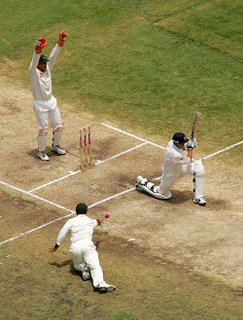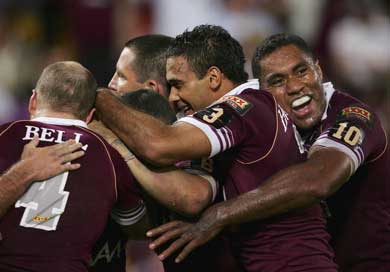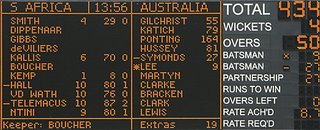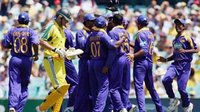An attempted sweep by Geraint Jones made no contact. The ball rebounded off his pad and Shane Warne (aided by team-mates) launched into an enthusiastic appeal for LBW. While all this was going on, Ricky Ponting scooped the ball in the direction of the stumps. Jones, seemingly paralysed by the fear that the umpire's decision would extend his series of low scores, had not regained his ground. The result? LBW appeal - not out. Run out appeal - OUT!

It's moments like these that see Australia winning the series quite comprehensively. Whether taking crucial catches rather than dropping them, or reacting to momentary chances, the key to Australia's success is being on-the-ball and taking opportunities. It's not as if England don't know the rules - Australia are just more "keyed in".
Chatting with a friend about Jesus's "Love one another" statements, my friend commented that it's not exactly rocket science. I kind of agreed. With the exception of incredibly selfish individual, most people can grasp the concept of loving one's fellow human beings - after all it's simpler than the rules of cricket ;)
But it's putting it all into action that is the key. Just as in cricket, the challenge is to be alert - see the opportunities - and make a difference.







 So when Ponting and Symonds combined again last Sunday, it may well have been a case of "We've got out of this before - we can get out of it again". Same thing goes in life. There are ups and there are downs. Good patches and bad patches. Somehow we always manage to get through the tough times, and on to better times. The trick is, when we go through another bad patch, to remember that "We've got out of this before - we can get out of it again".
So when Ponting and Symonds combined again last Sunday, it may well have been a case of "We've got out of this before - we can get out of it again". Same thing goes in life. There are ups and there are downs. Good patches and bad patches. Somehow we always manage to get through the tough times, and on to better times. The trick is, when we go through another bad patch, to remember that "We've got out of this before - we can get out of it again".
 Second ball of the match, Gilchrist is out for no score. A few minutes later and Katich is lbw. Martyn raced to 8, but was out just as quickly. Three players out for just 10 runs and things are looking very bad. The tv people (as they do) continue to show replay after replay, and by now one starts to feel quite deflated.
Second ball of the match, Gilchrist is out for no score. A few minutes later and Katich is lbw. Martyn raced to 8, but was out just as quickly. Three players out for just 10 runs and things are looking very bad. The tv people (as they do) continue to show replay after replay, and by now one starts to feel quite deflated.